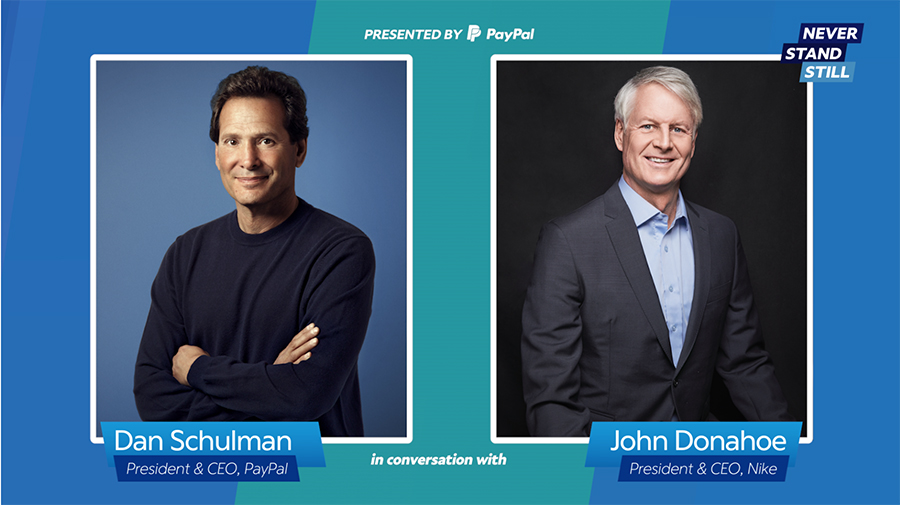John Donahoe, Nike’s CEO, recently talked with PayPal’s CEO, Dan Schulman, about leadership and purpose-driven business in PayPal’s “Never Stand Still” online leadership discussion series. The two also discussed navigating each company through COVID-19 and against racism within each CEO’s respective business.
Donahoe met Schulman while he worked at eBay from 2005 to 2015 and where Donahoe guided a turnaround and engineered its split of eBay and PayPal. Schulman was appointed CEO of PayPal in 2014.
The interview was recently made public before Nike reported its fourth-quarter earnings results. Here SGB Executive includes excerpts from their conversation.
Donahoe, who took over CEO at the start of 2020, was first asked to describe his “servant leadership” management style. He said he learned from Tom Tierney, his mentor and former boss at Bain & Co.
“To me, servant leadership is all around how do you serve your purpose, serve your customers, serve your teammates, and serve the communities in which you operate,” said Donahoe. “I feel like service is one of those incredibly important sources of inspiration because resilience turns out to be a really important thing. As you know, there are lots of ups and downs, you never accomplish anything great without embracing adversity. And service is just one of those things that lead you through.”
He described his rise to become Nike’s fourth CEO at this point in his career as “funny” because he had long looked to Phil Jackson and Mike Krzyzewski as leadership role models and pictures of both legendary coaches, along with Georgetown’s John Thompson of Georgetown and Stanford’s Tara VanDerveer, hang on his Nike office walls.
All four coaches, according to Donahoe, are “service leaders” that work to bring the best out of individuals they coached to support their teams’ success. Donahoe “loved watching” the ESPN documentary, “The Last Dance,” because it demonstrated how Phil Jackson was able to get the best out of his players for the team.
“His job is how do I get these incredibly talented people that are far more talented than he was to play together, buy into a greater purpose, and perform. And that’s how I’ve always viewed leadership in my career. How do I get people that are far better than I am on the playing field…to buy into a higher purpose, come together as one team…and perform at even higher levels.”
Asked about Nike’s purpose, he said service and purpose “are the two places I get my sources from for inspiration.”
Nike’s purpose, he said, “is ‘to bring inspiration and innovation to every athlete in the world’ and there’s an asterisk next to ‘athlete in the world.’ And then the bottom the asterisk says, ‘If you have a body, you’re an athlete.’”
He cited one of the underlying drivers of Nike’s purpose that he has long related to is the “deep belief in human potential,” epitomized by the “Just Do It” slogan.
Donahoe said, “Nike is always stood for a belief that everybody has a well-spring of potential inside of them that’s even greater than they understand. And it’s a very human brand in that way.”
The second driver is the “power of sport,” and he believes sports have become “one of the few things that bring people together” in an increasingly polarized environment.
Said Donahoe, “It brings people together within a country, and it brings people together across nations, and it brings people together on a level playing field. Talk about diversity and inclusion. It doesn’t matter the color of your skin, your height, your weight, your background, your ethnicity, or sexual orientation. If you can play, you’re allowed to play. And you play under a series of civil rules, it’s competitive. But sport brings people together. And, so I feel like the world needs sport more today than ever before. And I feel so privileged to be part of Nike because we can help promote sport and promote that sort of deep belief in human potential.”
The two also discussed corporations’ role in social justice in wake of the civil protests.
PayPal, in June, had pledged over $500 million to support minority-owned U.S. businesses, Nike, along with Michael Jordan, earlier this year committed $140 million to Black causes while also announcing several initiatives internally to elevate its diversity and inclusion efforts.
Donahoe spoke about Nike’s long history with Black culture since the brand’s beginning.
“Black culture has been a core part of Nike’s brand and identity, whether that’s the Jordan Brand, the Converse brand or the Nike Brand. And our consumer base skews demographically more toward the black community.”
He also noted that many of the athletes “Nike holds up as not only our heroes but heroes of society,” are Black, citing Michael Jordan, Bo Jackson, Tiger Woods, Kobe Bryant, LeBron James, Serena Williams, Lisa Leslie and Simone Biles.
But he noted that while Nike is well known for taking stands against racism with the public given its Colin Kaepernick affiliation and the brand’s “For Once, Don’t Do It” campaign introduced earlier this year, Donahoe this year recognized that Nike still has some ways to go addressing diversity and inclusion internally.
He said, “As I’ve talked to some of our teammates internally, while our representation numbers are pretty good, they’re saying, “John, you know what, we need to do better.’ We need to do better in terms of representation, building a real culture of diversity, inclusion and belonging. And not just for our Black teammates but for our Latinx teammates, for our Asian teammates, our Native American teammates, LGBTQ, the military veterans, those with disabilities…and so there’s been a real call to action to raise our game on that front. I think we’re good. But we’re far from great.”
He added, “And so just these last few weeks has really reminded me how this is a journey that you’ve got to really double down and redouble down and recommit yourself to time and time again.”
Schulman added, “It’s not enough to condemn racism. You have to actually be anti-racist. You have to be in the fight. You have to be willing to take a stand, which is why we committed over half a billion dollars. Because, I want this to be more than a moment, but a movement.”
Listen here to the full conversation.
Photo courtesy PayPal
















